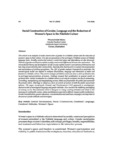Please use this identifier to cite or link to this item:
https://cris.library.msu.ac.zw//handle/11408/1829| Title: | Social construction of gender, language and the reduction of women’s space in the Ndebele culture | Authors: | Matsa, Winniefridah | Keywords: | Gender Socialization, Social Construction, Gendered Language, Gendered Attitudes, Woman’s Space | Issue Date: | 2015 | Publisher: | Midlands State University | Series/Report no.: | The Dyke;Vol. 9, No. 1; p. 65-87 | Abstract: | This article is an analysis of social construction of gender in a Ndebele culture and the reduction of women’s space in that culture. It is also an assessment of the portrayal of Ndebele women in Ndebele language texts. Socially constructed women’s constricted space and dependency are also discussed. Theories of gender socialisation explain socially constructed differences between men and women. The interactionist theory and development of self-concept explain women’s perceptions of themselves and how they are perceived by their communities. Reproduction theories serve to explain the perpetuation and maintenance of existing perceptions. The ABC of gender analysis Framework in particular, the narratological model was applied to analyses illustrations, language and interaction of males and females in a Ndebele culture. The content analysis of Ndebele novels was done to elicit qualitative data on portrayal and perceptions of women. Findings revealed that socialisation in general results in gendered skills. Gender socialisation in a Ndebele culture is not only for exclusion, but also for demeaning, controlling, manipulating and marginalising women. Males are prepared for the public and women for the private sphere. Marriage is valued as a form of control of women in both the public and private spheres. The paper recommends (Gender and Development) GAD approach to development, deconstruction of stereotypical language and gender attitudes. Also crucial is the redefining and defying of existing norms. Resocialisation which is designed to change existing attitudes and beliefs is also necessary to instil public norms, values and behaviors expected in different modern public institutions. Gender resocialization, gender education, conscientisation and awareness campaigns are important to deconstruct gender attitudes and stereotypes. | URI: | http://hdl.handle.net/11408/1829 | ISSN: | 1815-9036 |
| Appears in Collections: | Research Papers |
Show full item record
Page view(s)
124
checked on Feb 11, 2026
Download(s)
116
checked on Feb 11, 2026
Google ScholarTM
Check
Items in MSUIR are protected by copyright, with all rights reserved, unless otherwise indicated.




